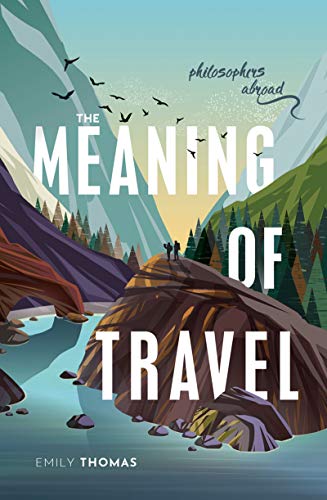Non-fiction review: The Meaning of Travel, by Emily Thomas
I've been doing a lot of reading about travel, mostly accounts of travel or adventures/exploration. I'm also getting more interested in the philosophy and psychology of an activity that I greatly enjoy and at times feel driven to pursue.

Title: The Meaning of Travel: Philosophers Abroad
Author: Emily Thomas
Publication Info: Oxford University Press, 2020. 261 pages
Source: Library
Publisher's Blurb:
How can we think more deeply about travel?
This
was the thought that inspired Emily Thomas to journey into the
philosophy of travel, to explore the places where philosophy and travel
intersect. Part philosophical ramble, part memoir, The Meaning of Travel
begins in the Age of Discovery in the sixteenth century, when
philosophers first began thinking and writing seriously about travel It
then meanders forward to encounter the thoughts of Montaigne on
otherness, John Locke on cannibals, and Henry Thoreau on wilderness.
On
our travels with Emily Thomas, we discover the dark side of maps, how
the philosophy of space fueled mountain tourism, and why you should
wash underwear in woodland cabins... We also confront profound
questions, such as the debate on the ethics of 'doom tourism' (travel to
doomed places such as glaciers or coral reefs), and how space travel
might come to affect our understanding of human significance in a
leviathan universe.
The first ever history of the places where history and philosophy meet, this book will reshape your understanding of travel.
My Review:
I'm not sure this book quite lived up to the last line of the blurb, but it did cause me to do some thinking about travel, what I do when I travel--and why we value it so highly. It probably deserves another read to get a better grip on what the author is trying to do, but I can't say that I'm inspired to reread.
Probably the history, not the philosophy, of travel is what interested me most here. The evolution of European ideas about wilderness and mountains, the introduction of the "Grand Tour" of the Continent (i.e. Europe) as a means of education, and the moral dilemma of "doom tourism" were the aspects that grabbed my attention.
I have long accepted the idea that travel is good for us, broadens the mind, prevents a narrow provencialism, etc. That may fall more into the area of excuse than reason.
Reading this book and others that remind me how early mountaineering always had the excuse of "science" and exploration also makes it plain that for most of us today, hiking, climbing, and tourism are about a desire to see things. A fear of missing out? Our travels may not offer a lot of room for philosophy or personal growth. Science and exploration seem unavailable to most of us, other than exploring our own personal limits, physical and psychological. I have here gone beyond what the author directly discusses, but demonstrated the kind of thinking the book induces.
My Recommendation:
This is probably a worthwhile read for those interested in the subject. For my own quest to understand how walking, hiking, and travel have played into my personal and spiritual growth, I'm finding other books more helpful.


Comments
Post a Comment
Let us know what you think! We love to hear from our readers!